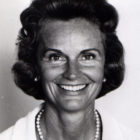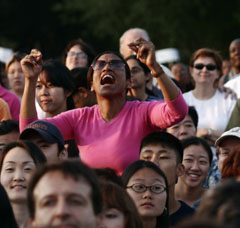Jehovah’s Witnesses, right, distribute materials as an independent street preacher, left, passes by on Feb. 10, 2018, near Olympic venues in Gangneung, South Korea. RNS photo by Madeline C. Mulkey
Need to know: Friday, February 23, 2018
Mulkey story
Hi Madeline: I hope your trip is everything you hoped! Thanks for this story. It's a good start, but needs more depth, context and details. Could you please revise it? Here's what I'm looking for and some questions.
- An explanation of why missionaries come to the Olympics. Why do they see this as a good opportunity? Who are they? Retired people? Clergy? Young people? Or a mix? And are they targeting in their mission work? Athletes? If not, who? If each is sharing the Gospel in their own way, give an example or two of their differing approaches.
- At one point you talk about 3,000 missionaries and then at another point, 2,000. Is it 2,000 at Gangnang and then 1,00o more somewhere else? Where? Are the mostly doing their work in Olympic Park, or on the outskirts - hotel lobbies? transportation hubs? Where?
- We need a bit on religion in South Korea weaved into the story. Here's a good source on that: http://www.pewresearch.org/fact-tank/2014/08/12/6-facts-about-christianity-in-south-korea/
- Do missionaries always go to the Olympics or is this a first? If not unique to these games, how does the size and approach of this missionary force compare to those at past Olympics?
- Give us a better idea of what pin trading is, especially since you spend much time on it. What kind of pins are we talking about? The little pins people wear on their lapels? Pins of a flag of a nation? You refer to "normal" pins. What's a normal pin? Clue us in a little as to what this tradition is about so it makes more sense when you tell us its been adapted by missionaries. And if you are pinning for Coca Cola, what exactly are you doing?
- Please go back to the Americans you interviewed, or find some new ones, and ask them not just about pinning, but what drew them to the Olympics, what a day of being a missionary there is like, what they're trying to achieve and what they count as a success.
[slingshot_ad name=”Slingshot Middle Cube Ad”]
Latest news from RNS
Myanmar bulldozes what is left of Rohingya Muslim villages
(AP) — Human rights groups say Myanmar's government is destroying crucial evidence of mass atrocities against the nation's ethnic Rohingya Muslim minority.

Ruth Graham: The silent rock behind a famous evangelist
(RNS) "Your counsel, advice, encouragement and prayer have been my mainstay and at times I have almost clung to you in my weakness, in hours of obsession, problems and difficulties," Billy Graham wrote in a 1963 letter to his wife, Ruth.
Private funeral and weeklong events planned for Billy Graham
Billy Graham will be buried March 2 following a funeral service under a tent similar to the one where the evangelist held his first major revival nearly 70 years ago.
More views from RNS
I have no doubt what Billy Graham would have told the high school kids from Parkland, Fla.
(RNS) — The teens speaking out about gun control these days are amazingly articulate about being young in an America where violence is all too present as a fact of life. What would Graham have said to them? Keep at it!

COMMENTARY: Billy Graham, reaching the last person in the last row
(RNS) His fragile humanity came through, even in his younger, more electrifying days, deepening his connection with the masses, helping people see that he was one of them, on the same journey, facing the same struggles.
Billy Graham’s new home, by Franklin Graham
(USA Today) — Franklin Graham remembers his father, Billy Graham: 'While many around the world mourn his physical death, he is now celebrating the eternal life he spent over 70 years telling millions of people about.'
[slingshot_ad name=”Slingshot Bottom Cube Ad”]





